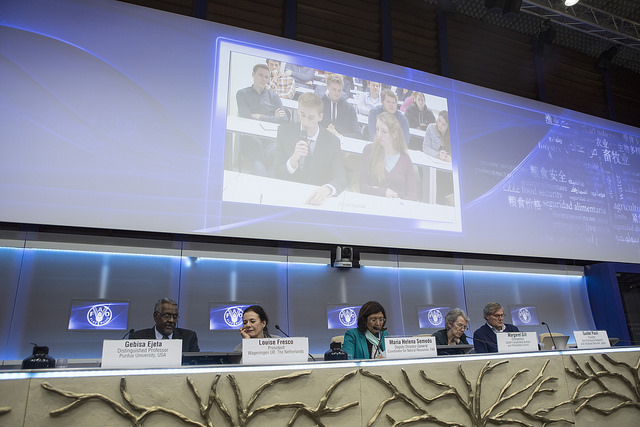-
About
- Our Work
- Get Involved
- Stay Updated
FAO gives Students the floor to bring Youth Perspectives to Policy makers on Agri-Biotechnology
 On the occasion of the international symposium: The Role of Agricultural Biotechnologies in Sustainable Food Systems and Nutrition, a special interactive youth session was co-organized by Office of Partnerships, Advocacy and Capacity Development (OPC) of FAO and YPARD : the “Young Professionals for Agricultural Development” network.
On the occasion of the international symposium: The Role of Agricultural Biotechnologies in Sustainable Food Systems and Nutrition, a special interactive youth session was co-organized by Office of Partnerships, Advocacy and Capacity Development (OPC) of FAO and YPARD : the “Young Professionals for Agricultural Development” network.Seven universities from around the world grasped the chance to follow and contribute the symposium remotely, through live video-audio participation. The universities hosted ‘webinars’ on campus to watch the Opening Session of the Symposium. Then, students gathered their inputs and presented their suggestions during the interactive session, to five eminent panelists. The key messages of the students' session were brought to the closing session of the Symposium. This is the first of the kind for FAO, and it proved an effective way to open the floor to a massive audience of students. Students were able to convey key messages that THEY considered important to policy and decision makers.
American University of Beirut (Lebanon), Bogor Agriculture University (Indonesia), Cornell University (USA), Universidad Nacional de Colombia, WACCI: University of Ghana and Wageningen University (Netherlands) took this challenge. Università degli Studi di Roma "La Sapienza", American University of Rome and University of Roma Tre were also represented in the audience. The session further welcomed many interactions online: over 30 universities, IAAS: the International Association of students in Agricultural and related Sciences, and YPARD Community of +12 500 members attended through live streaming and twitter interaction.
The students eloquently presented their statements and posed a wide range of questions to the panelists—covering issues related to job opportunities, engagement with FAO policy makers, integration of science, communication gap between small holder farmers and researchers, access to new biotechnologies, importance of protecting biodiversity, the relation to agroecology, regulations, IPR and conservation of local genetic resources.
The main messages from the session are:
- The student community is keen to dialogue with policy and decision makers and welcome initiatives where they can participate and convey their suggestions.
- Students are mostly aware of the advances in new biotechnologies but consider that agriculture biotechnology must have a comprehensive approach and be better linked with other food and agriculture related subjects for sustainable livelihoods;
- It is essential to ensure participation of farmers and smallholders in the policy processes and improve communication when transferring biotechnologies to meet their needs.
The five panelists had key messages for the student community as well. They urged students to “build a strong foundation of education, bring their skills to transform agriculture, to understand the problems, learn, unlearn, take risks, innovate and find new –linkages and applications to address the current and future challenges”. The panel included: Louise Fresco, President of Wageningen University; Maria Helena Semedo, Deputy Director-General of Natural Resources, FAO; Gebisa Ejeta, Professor at Purdue University; Margaret Gill, Chair of the CGIAR Independent Science and Partnership Council and Gunter Pauli, Founder of Zero Emission Research and Network. Kakoli Ghosh, OPC, moderated the session which was webcasted in English French and Spanish.
Panellists and students alike asserted that such sessions should be repeated - similar sessions could be organized on selected themes by international organisations and universities to voice students’ ideas and perspectives better. FAO could play a key role in ensuring that Students’ perspectives keep being heard by policy makers. All means are available nowadays for engaging with young people in different ways; and indeed there is no sustainable development without involving the new generation.
“The symposium was an enlightening and useful way to engage with FAO, with the symposium speakers and with other students involved in food and agriculture related topics. Both the panel and the students were drawn from a diverse range of backgrounds: a real strength of the session considering the multi-disciplinary nature of the food sector, as highlighted by Professor Margaret Gill.” – Elinor Brett, MA in Food Studies (American University of Rome)
Missed the session? Watch the record on youtube: https://www.youtube.com/watch?v=4t-vLUvVBns
Have a look at the picture of the students’ session on Flickr: https://www.flickr.com/photos/
faonews/sets/ 72157664593781331/ Check a selection of Live-tweets from on Storify: https://storify.com/FAOKnowledge/udent-interactive-session-bringing-fresh-perspecti
Picture copyright:FAO/Pier Paolo Cito. Editorial use only. Copyright :copyright:FAO.
About the author
Related Posts
Comments
No comments made yet. Be the first to submit a commentBy accepting you will be accessing a service provided by a third-party external to https://www.ypard.net/
Get in touch
Email: [email protected]
YPARD Global Coordination UnitHosted by AGRIDEA and the Czech University of Life Sciences Prague
Lausanne, Switzerland and Prague, Czech Republic - Our Work

 On the occasion of the international
On the occasion of the international 